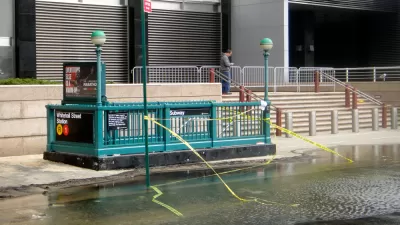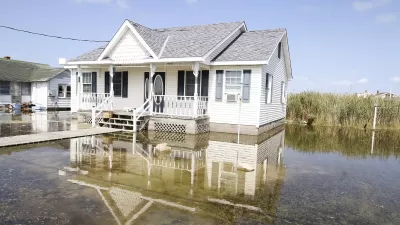The worsening effects of extreme weather events are accelerating the deterioration of critical infrastructure, leaving communities more vulnerable.

Writing in Axios, Andrew Freedman highlights the urgency of building resilient infrastructure in a changing climate. Pointing to recent examples of flooding, fires, and heat waves devastating communities across the country, Freedman writes, “This summer has demonstrated again and again that our infrastructure is not sufficient to withstand the changed climate of today, let alone the impacts on the horizon.”
“We have long designed our infrastructure as if the climate conditions and extremes of the past, such as the definition of a 100-year, 500-year or even 1,000-year flood in a particular location, would hold true in the future.” But predictive models about climate change may not accurately capture the rate of change, Freedman notes. “Some climate scientists and activists raise the possibility that climate change is already resulting in surprises missing in their models, such as the breaching of the once unthinkable temperature of 104°F (40°C) in the U.K., for example.”
With extreme heat waves becoming more likely, fires growing more powerful, and floods affecting more places, upgrading and replacing aging infrastructure must happen at a much faster pace than previously thought.
FULL STORY: We haven't built for this climate

Planetizen Federal Action Tracker
A weekly monitor of how Trump’s orders and actions are impacting planners and planning in America.

Congressman Proposes Bill to Rename DC Metro “Trump Train”
The Make Autorail Great Again Act would withhold federal funding to the system until the Washington Metropolitan Area Transit Authority (WMATA), rebrands as the Washington Metropolitan Authority for Greater Access (WMAGA).

DARTSpace Platform Streamlines Dallas TOD Application Process
The Dallas transit agency hopes a shorter permitting timeline will boost transit-oriented development around rail stations.

Renters Now Outnumber Homeowners in Over 200 US Suburbs
High housing costs in city centers and the new-found flexibility offered by remote work are pushing more renters to suburban areas.

The Tiny, Adorable $7,000 Car Turning Japan Onto EVs
The single seat Mibot charges from a regular plug as quickly as an iPad, and is about half the price of an average EV.

Supreme Court Ruling in Pipeline Case Guts Federal Environmental Law
The decision limits the scope of a federal law that mandates extensive environmental impact reviews of energy, infrastructure, and transportation projects.
Urban Design for Planners 1: Software Tools
This six-course series explores essential urban design concepts using open source software and equips planners with the tools they need to participate fully in the urban design process.
Planning for Universal Design
Learn the tools for implementing Universal Design in planning regulations.
Municipality of Princeton
Roanoke Valley-Alleghany Regional Commission
City of Mt Shasta
City of Camden Redevelopment Agency
City of Astoria
Transportation Research & Education Center (TREC) at Portland State University
US High Speed Rail Association
City of Camden Redevelopment Agency
Municipality of Princeton (NJ)





























